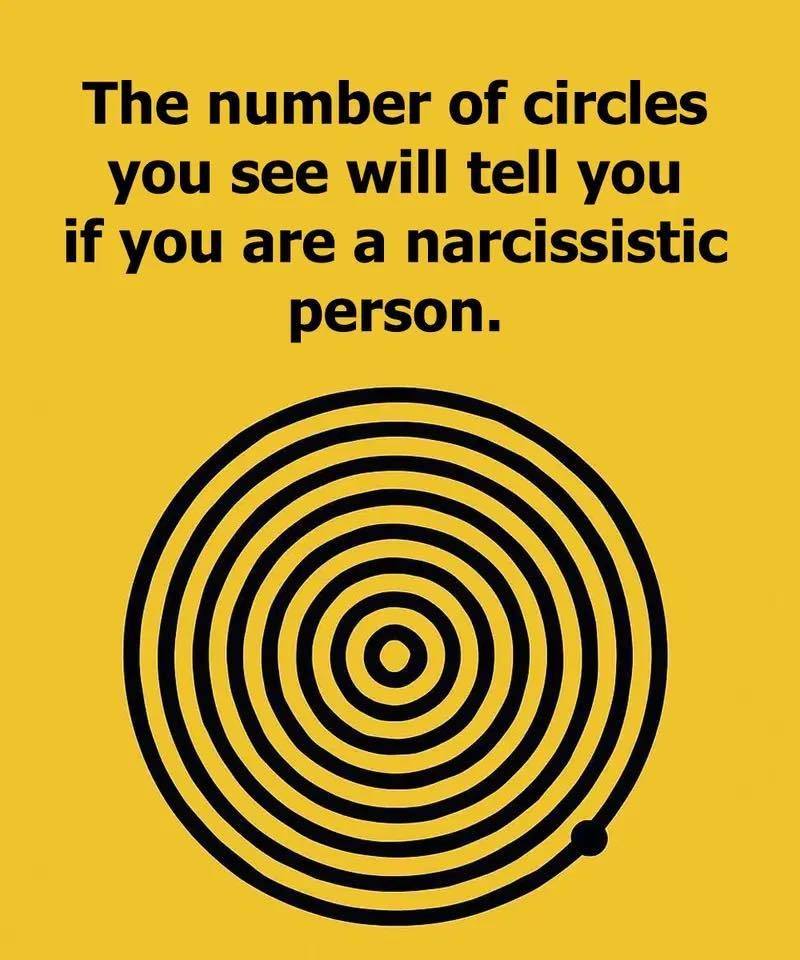Are You a Narcissist? The Number of Circles You See Could Reveal It
Personality tests come in all shapes and forms — from in-depth psychological assessments to fun visual puzzles shared online. One recent trend making waves across social media claims it can reveal narcissistic traits based on how many circles you see in an optical illusion.
It sounds like a trick, or just another viral brain game. But is there really a connection between what you see in an image and your personality — specifically, narcissism?
Let’s explore the theory behind this unusual test, how it’s supposed to work, and what it might actually say about your mindset.
🌀 The Optical Illusion: How Many Circles Do You See?
In the viral image (which has circulated widely on TikTok, Reddit, and other platforms), viewers are shown what appears to be a complex geometric design. Some people immediately spot several overlapping circles, while others see a tangled pattern of lines or shapes.
According to the claim, the number of circles you can identify quickly reveals something about your personality — particularly whether you lean toward narcissistic tendencies.
Here’s how the breakdown typically goes:
1–3 Circles: You’re likely to be more self-centered, possibly with narcissistic traits. You tend to see only what stands out to you, missing the bigger picture.
4–6 Circles: You’re somewhere in the middle range — aware of others but still focused on your own perspective.
7–12 Circles: You’re more empathetic, observant, and in touch with your surroundings, with lower narcissistic tendencies.
Sounds fascinating, right? But can we really detect narcissism with a simple visual?
🧠 The Psychology Behind the Claim
What Is Narcissism, Really?
Narcissism is a personality trait characterized by:
Inflated sense of self-importance
Lack of empathy
Need for admiration
Difficulty recognizing others’ needs or perspectives
While Narcissistic Personality Disorder (NPD) is a clinical diagnosis, most people exhibit some level of narcissistic traits at times — especially in competitive or social environments.
Why Might an Optical Illusion Work?
Though not a scientifically validated test, the theory is based on the idea that how we perceive complex visual stimuli might reflect our level of self-focus vs. broader awareness.
Those who see fewer circles may focus only on the central or most obvious elements — reflecting a more inward, self-centered view.
Those who spot more hidden circles may be more detail-oriented and aware of what lies beyond the surface — a trait often linked with empathy and emotional intelligence.
🧐 Can You Really Diagnose Narcissism With This?
Let’s be clear: No optical illusion can accurately diagnose narcissism or any personality disorder. Real psychological assessments require standardized testing, in-depth interviews, and professional evaluation.
However, these types of visual puzzles can be fun tools for self-reflection. They might highlight how your brain filters information — do you focus on what’s most obvious, or do you notice subtle details others miss?
In that sense, the illusion is less about narcissism and more about your cognitive style — the way you process and prioritize visual information.
